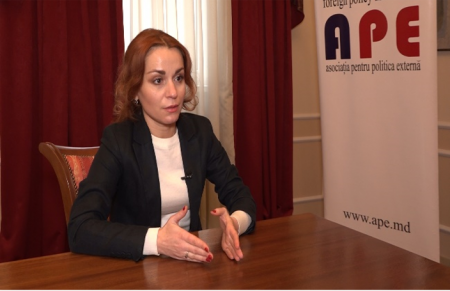The geostrategic potential of the Black Sea region has often been overlooked. Natalia Stercul analyses why this is changing in the face of the war, what economic perspectives are open to the EU and what part the Republic of Moldova plays in this.
The Black Sea region has seldom been seen as an area of strategic importance, and its potential for cooperation has often been overlooked. Yet this geostrategic region has long represented the transit zone between the East and the West and between the north and the south as well. The great powers failed to recognise the significance that the Black Sea countries have for the emerging security architecture of the region, despite the recent history of the area around the Black Sea littoral, which has seen multiple wars and political turbulence unmatched in any other maritime space in the world.
The outbreak of the war in Ukraine revealed the economic potential of this area, however, especially in relation to its importance as an energy and transportation route to Europe. The war also caused a shift in the perception of the geopolitical importance, in the broadest sense, of the countries of the Black Sea basin, with regard to military challenges, secure trade and travel, and agricultural exports to global market and other aspects.
Although the EU and NATO enlargements brought the Black Sea countries closer to the West and enabled their inclusion in Western mechanisms, the international visibility of the region remained, until recently, practically nil. When bombing and the blockades imposed by the Russian Federation on the Ukrainian territory disrupted supplies of energy and agricultural products, however, the international public became acutely aware of the vital role played by the region, a realisation that triggered shock waves through the global economy. Hence, the Black Sea region plays a pivotal role for the flow of trade between the East and the West, and the exchange of goods and resources through the transportation routes and pipelines that transit through the Black Sea area is of growing importance given overall economic patterns and the emerging geopolitical situation.
Economic and energy significance of the Black Sea region
The presence of large reserves of important natural resources under and around the Black Sea makes the region one of geostrategic and geoeconomic significance for the global energy players. The exact volumes of natural gas are unknown, but rough estimates predict that the Ukrainian shelf may contain more than two trillion cubic meters of gas. A conservative estimate of the reserves of Romania, one of the region’s richest countries in terms of natural resources, put them at around 200 billion cubic meters. Georgia’s gas resources are thought to be of a similar scale, while Bulgaria’s reserves are believed to contain sufficient gas to meet more than 30 years’ worth of country’s annual needs. Turkey, a regional player that is striving to become an energy hub to Europe, recently announced that the discovery of a new reserve had brought the total volume of its Black Sea natural gas resources up to 710 billion cubic metres. This means that the area could make a vital contribution to the energy security of Europe and could become a key factor for an integrated regional economy.
That the region’s agricultural potential is also of importance for European economic security has also become evident. When the war began, the Russian Federation imposed a blockade on Ukrainian ports that disrupted grain supply chains, particularly those supplying developing countries, and resulted in huge increases in global prices. In view of all of this, the EU should consider the security of the Black Sea region to be a key factor in the broader European and Euro-Atlantic security. As the war continues, successfully addressing the security issues of the Black Sea basin will be essential to maintaining the stability of economic and commercial relations between the East and West.
Russia’s war against Ukraine succeeded in drawing attention to the strategic importance of the Black Sea region. In its attempts to free itself of its energy dependence on Russia and to develop alternative sources, the EU focussed on possibilities for cooperation in the field of oil and gas exports with Azerbaijan. Consequently, the European Commission and the Government of Azerbaijan signed a memorandum of understanding concerning the intent to double the natural gas imports to the European bloc by 2027. This and other actions are the result of the initiatives to diversify the energy resources of the European countries and to make Europe less susceptible to blackmail and pressure from the Russian Federation via this sector.
The place and role of the Republic of Moldova
Moldova can point to several achievements resulting from its engagement with the Black Sea region since the establishment of the BSEC, of which it is a founding member. One of the most important areas of cooperation is that encompassing projects relating to the interconnection of the Moldovan and European energy and electricity sectors. The Iasi-Ungheni-Chisinau pipeline, which became operational in 2020, was built to ensure that natural gas could be transported to Moldova through Romania. Another project involves the construction of the high-voltage Isaccea-Vulcanesti-Chisinau power line. This project, launched in 2019 with the support of the EU, the European Bank for Reconstruction and Development, the European Investment Bank and the World Bank, is expected to be completed by the end of 2025. Once completed, it would enable Chisinau to free itself from its partial dependence on electricity from the Transnistrian region and to connect to European energy distribution networks.
The prospect of broader involvement by Moldova in the activities conducted by the countries of the Black Sea region was welcomed on the sidelines of the Atlantic Council event dedicated to the Three Seas Initiative held during the Munich Security Conference in February 2023. Bogdan Aurescu, the Romanian Minister of Foreign Affairs, reiterated the openness to the participation of the Republic of Moldova in the activities of the platform, which will create opportunities for the development of infrastructure, energy sources and bridges over the Prut and will facilitate faster and simpler access to the European space. Moldova’s participation in the initiatives developed by the countries of the Black Sea region could be an additional element supporting the pro-European orientation of the Republic of Moldova.
Reconstructing the post-war Black Sea region: future prospects for the EU
Despite being an important political partner of the Black Sea countries as well as a significant market for their energy resources, the EU has failed to become an important player in relation to security in the region. There have been some individual initiatives aimed at supporting the integration of the Black Sea region into the European project, such as the Eastern Partnership, but none of these involves an overall strategy for the entire region. Such a strategy would require the construction of proper infrastructure and transit capacities from the Black Sea to Europe, as well as the development of infrastructure for a potential capitalization of renewable energy resources.
When rethinking the importance of Black Sea region, though, it would be unwise to forget that Moscow is interested in keeping transit volumes and new projects in this area. Moreover, Russia’s strong position in the Black Sea states enables the Kremlin to pursue political and economic expansion aims in the Balkans and the Middle East. The gist of the new Maritime Doctrine of the Russia Federation, released in 2022, is clearly enunciated in its first strategic objective: “Development of the Russian Federation as a great maritime power and the strengthening of its position among the leading maritime powers of the world”. The doctrine clearly indicates that the United States and NATO are Russia’s chief adversaries.
A complex approach to the Black Sea region as a space with special potential for collaboration aimed at securing the energy needs of the European continent would enable a reduction of the energy dependence on Russia, while also ensuring the diversification of the economy of the Black Sea littoral states and their gradual integration into the common projects of the European Union. The war in Ukraine has considerably weakened Russia’s geopolitical influence in the region and caused the states of the Black Sea basin to review those of their strategic partnerships that are directly related to ensuring and maintaining security. Although China has not officially prioritized the Black Sea region in its Belt and Road Initiative, its economic influence could become a challenge for the European Union in the medium term. For these reasons, the EU should use the current window of opportunity to establish lasting contacts through an integral and synergy-based approach to the post war Black Sea region.
Published in: the Zentrum Liberale Moderne (LibMod) https://libmod.de/en/security-and-synergies-the-importance-of-the-black-sea-region-and-russias-war-on-ukraine/







